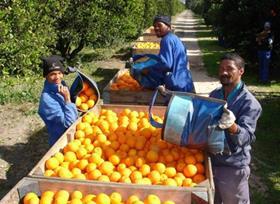
While growers in South Africa’s early production regions are getting ready to pack their first fruit of the 2019 season, industry leaders are gathering around the country to discuss the major challenges facing them.
This week will also see the finalisation of the 2019 export forecast. It is widely expected that the industry will announce prospects for another record crop.
Steep growth, mainly in lemons, mandarins and late Navels in recent times saw export volumes reaching well beyond 130m cartons last season. Sources say the figure may well break through the 140m mark this year.
It is clear that how to handle this crop, and how to get it through the country’s ports and land it in foreign markets where they will continue to provide reasonable returns to growers, will dominate the agenda, as will grower discipline in market supply and greater use of processing options when required.
Overseas representatives of the CGA have been in South Africa for intensive discussions with various grower groups during the past week. They are Nick Gutierrez (CGA representative in USA), Mikhail Fateev (CGA representative Russia) and Rocco Renaldi (CGA representative EU).
Growers who attend the industry’s summit in Port Elizabeth this week will want clarity on a number of issues. Top of the list will be progress with wider access for South African citrus to the US, which was thought to be imminent in September last year. At present only citrus grown in the so-called ‘disease-free’ Western and Northern Cape regions can be exported to the US. Wider access would benefit citrus, Navel and mandarin growers in other parts of the country.
Also likely to be high on the agenda is relationships with the EU and the affect that Brexit will have on the industry. Towards the end of last year, tension increased between the South Africans and Spanish producers because of overlapping seasons, while the South Africans have been openly critical of the EU’s stance not to reduce punitive citrus black spot measures, despite the progress made by the country to reduce the risk.
It could be that, at this conference, steps are announced by the South African government to take the matter of CBS to the World Trade Organization for final arbitration.
As far as Brexit is concerned, CGA spokesman Justin Chadwick has confirmed that South Africa and the UK signed a ‘continuation agreement’ which will limit disruptions in the case of a hard Brexit.
Special CGA envoy to the EU and the USA, Deon Joubert, also stated that he would continue to represent the industry in direct talks with the administrations of the EU and the US.
Of equally crucial importance for discussions this week will be the creaking infrastructure in some of the country’s major ports and how to efficiently route fruit over long inland distances to ports and on to ships. These problems have been persisting for some time and while they will get much attention this week, it is likely that they will take a long time to solve.
To top it all, growers across the country will watch and discuss political developments inside South Africa. The ruling party has been struggling this year under a spate of corruption charges and service delivery problems. They will face a real challenge at the national election to be held on 8 May this year. How the ANC will come out of the election, will be telling for stability in the country, as will be the way it will handle the land issue.
Meanwhile, the best growers can do is focus on their own businesses and make sure they deliver the best products. The rest is beyond their control.



